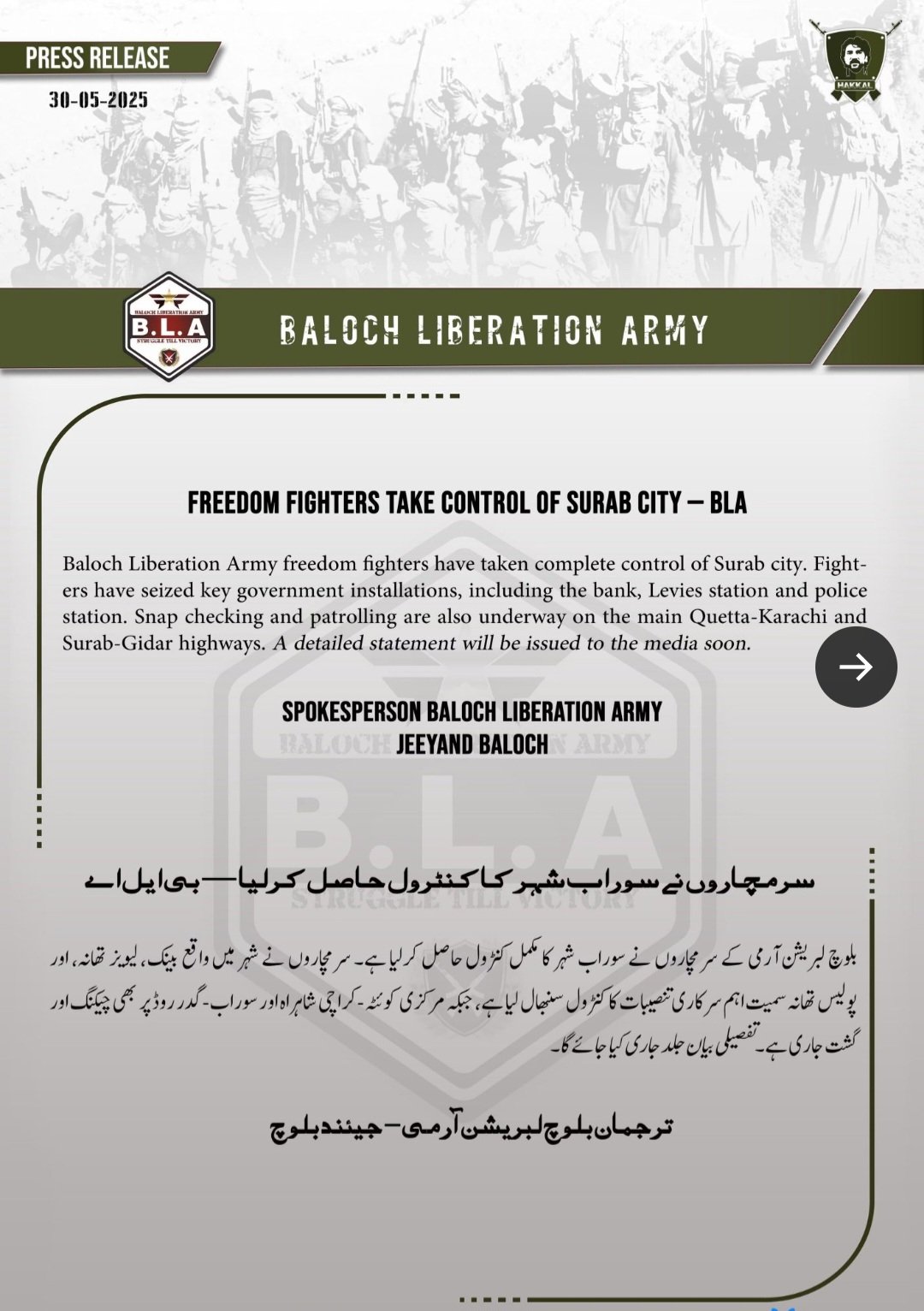.In a stunning and unprecedented move on May 30, 2025, the Balochistan Liberation Army (BLA) has taken full control of Surab city in Pakistan-occupied Balochistan. In coordinated assaults, BLA fighters overran key Pakistani government installations, including the Levies station, police station, and the National Bank. Videos from the ground show government buildings in flames and plumes of black smoke rising into the sky.
The fighters also set up checkpoints on the Quetta-Karachi and Surab-Gidar highways, seizing control of critical transport routes in the region. Several government officials were taken hostage. According to sources, the Assistant Deputy Commissioner Hidayatullah died of suffocation after being locked inside a burning building. A Station House Officer was reportedly killed during resistance.
No official statement has been issued by Pakistan’s leadership. Notably, the takeover occurred the same day Army Chief Asim Munir visited Quetta, exposing the fragility of state control even as top brass postured nearby.
Why Surab Fell: A People Betrayed and Rising
The BLA’s success in Surab is not an isolated event—it is a symptom of Pakistan’s long-standing abuse of Balochistan and its people. Since the forcible annexation of the Khanate of Kalat in 1948, Balochistan has been treated as a colony, not a province.
Rich in resources like gold, gas, copper, and uranium, Balochistan fuels Pakistan’s economy and Chinese interests via the CPEC project. Yet, the Baloch people remain the poorest and most oppressed in the region. There are no hospitals, no schools, no share in the profits—only military camps, disappearances, and state violence.
For decades, the Pakistan Army has disappeared thousands of journalists, students, and ordinary civilians, never to return. Entire villages have been razed in so-called anti-terror operations. Every act of suppression has only strengthened the BLA’s support among locals.
The people of Balochistan are no longer willing to live as slaves in their own land. Surab is their message: the colonial occupation will not last.
The Cracking State: What Surab Signals for Pakistan’s Future
The fall of Surab is not symbolic—it is strategic. It disrupts control of major roads, exposes Pakistan’s military weakness, and shows that BLA can strike deep and hold ground. For a state that built its legitimacy on military might and territorial unity, this is an existential crisis.
Worse, Balochistan isn’t the only province in revolt.
In Khyber Pakhtunkhwa, the situation mirrors the same decay. Tribal resentment, military excesses, and the suppression of the Pashtun Tahafuz Movement have alienated millions. Anti-state sentiment is widespread. Border areas increasingly operate outside state control. The Pashtun and Baloch struggles, while separate, reflect a shared resistance against Punjabi military domination.
One BLA spokesperson stated:
“Every symbol and structure of the occupying state will be dismantled. The struggle for national liberation will not stop.”

The Pakistan Army, overstretched and humiliated, can no longer contain multiple fires. Surab has proven that its grip on Balochistan is slipping—not just militarily, but morally, politically, and spiritually.
A Nation Unraveling
After years of silenced voices, enforced disappearances, and unheeded pleas, the Baloch people rose up to speak in the only language the Pakistan Army understands. With weapons, with fire, and with defiance. The Pakistan Army fled. The government vanished. And the people stood with the freedom fighters who raised the banner of liberation.
This isn’t terror, it’s a resistance born from decades of exploitation and erasure.
The BLA’s operation in Surab may well become the turning point in the battle for Baloch freedom. And as discontent spreads to Sindh, PoJK, and KP, Pakistan faces a future that looks less like a nation and more like a map waiting to be redrawn.


